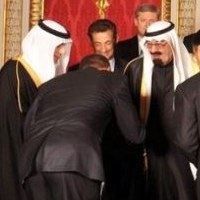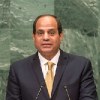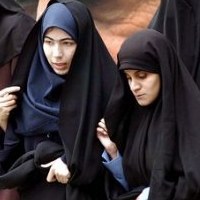![]()
Sunday, June 8, 2014 | MEForum | by Raymond Stock
First published at Fox News.
On Sunday June 8, Egypt’s former defense minister, Field Marshal Abdel Fattah el-Sissi, was inaugurated as the sixth president — a de facto pharaoh, though chosen by the people — of the oldest nation-state on earth.
As expected, Egyptians overwhelmingly voted May 26-28 to elect him to lead the country, which he as ruled indirectly since overthrowing his predecessor, Mohammad Morsi of the Muslim Brotherhood (MB), in the face of massive popular demand last July 3.
From the moment he ousted Morsi — who had turned a narrow electoral mandate in June 2012 into a brutal Islamist dictatorship almost overnight, alienating the vast majority of the country — the hugely popular El-Sissi has been ceaselessly attacked by a wide array of forces both at home and abroad.
These attacks have come not only from the Al Qaeda-allied MB and its Salafi allies in an increasingly violent insurgency that has so far claimed nearly 2,000 lives, but also from many Western journalists, Middle East experts, government officials and even key members of Congress, who have accused him of being just another military strong man who has usurped an elected leader.
Some even see him as holding onto a clandestine vision of religious rule of his own, and as a person far less popular than his cult of the personality suggests.
Though there are some elements of truth in this criticism, driving much of it is a combination of ideological blindness and ignorance (or denial) of the basic facts about both El-Sissi and his country, plus an idealistic demand for perfect democracy in a time of bloody upheaval in a land that has known essentially harsh, pharaonic-style rule for the past five millennia.
Here are three big things to know about the new president of the largest Arab country, which since 1979 has been America’s closest ally in the Middle East after Israel.
1. Despite claims to the contrary, El-Sissi does have an electoral mandate.
With the MB and most Islamists, plus some of the original 2011 secular liberal activists boycotting the vote, about 35% of the population turned out to vote on May 26-27, in the midst of a searing heat wave.
This was roughly the same percentage for Morsi’s December 2012 Constitutional referendum, and for the vote on a de-Islamistized version of it that passed — by a far higher margin — in January 2014.
Still, this was not deemed enough, so balloting was extended to a third day on May 28 with the threat of fines for those who stayed away from the polls, an unusual move.
Egypt, like 21 other countries — including a number in Europe — has a compulsory voting law, though it is not usually enforced.
In the end, participation officially reached 47.5% — and a delegation of monitors from the European Parliament declared the election was run in a “democratic and free” manner, though it was “not necessarily fair,” due to self-censorship among some in the media.
This compares well with the 46% who turned out for the first round of presidential voting in May 2012, and the 52% in the second round that June — when there were no major boycotts, amid considerable suspense about who would win, while in this case, El-Sissi was a shoo-in.
A separate Election Observation Mission (EOM) from the European Union, while saying that the vote “fell short of constitutional principles,” stopped short of further criticism and added that the media atmosphere around it was “fair.”
Egypt’s election commission announced on June 3 that El-Sissi had won 96.91% of the votes, versus 3.09% for his only opponent, leftist politician Hamdeen Sabahi.
El-Sissi gained 23.78 million votes, 10 million more than the 13 million won by Morsi in June 2012, in which he narrowly beat Mubarak’s last prime minister, Ahmed Shafiq — who later complained that the vote count was fixed.
Sabahi earned but 318,000 votes, fewer than the 1.4 million spoiled ballots cast.
El-Sissi, whom the late pre-election opinion polls put at 74%-to-86% approval (roughly twice that of President Barack Obama’s at home at present), could not campaign in person due to the ongoing violence, as well as at least two alleged plots on his life.
This was compounded by the famously quiet (and deeply private) field marshal’s failure to even issue a detailed electoral program, fueling yet more speculation about what he really intends to do in office.
For its part, the MB has dismissed the current election as “null and void.”
2. Despite excesses, El-Sissi’s war against the Islamists is ours as well.
Some have argued that Morsi’s removal and El-Sissi’s election prove the validity of Al Qaeda’s objection to the MB’s strategy of gaining power through democratic means.
Hence, more of their followers will turn to AQ and similar groups out of frustration with the results from the use of peaceful means — which they say has happened in Egypt.
The assumption is that the Egyptians — not to mention the rest of us at war with Islamist terrorists — should accept whatever the fanatics do so long as they are elected, including quickly laying the groundwork for what was an obvious coup of their own, in which future elections either would not happen, or be meaningless if they did.
By this logic, perhaps to avoid alienating the MB’s base, we should have hoped for the Islamists to keep winning elections, as they did in the first parliamentary contests and the first presidency post-Hosni Mubarak — and then do nothing if they brazenly abuse the power they gain in this fashion.
That said, there have indeed been many abuses in the crackdown on the MB and its Salafi allies launched by the interim government that was appointed by El-Sissi.
Yet the first violence came from the opposition, as the MB wrongly blamed Egypt’s large Coptic Christian minority for Morsi’s ouster, inciting an immediate orgy of looting and burning of Christian churches, schools and homes by its supporters in July, the sabotage of public buildings, plus brutal attacks on police and others.
After a long standoff, roughly 700 to 1,000 persons died in operations to remove pro-Morsi demonstrators from two Cairo squares on August 14, though it later emerged from credible sources that armed provocateurs among them had opened fire first, and the graves of at least eighty people, tortured and murdered as suspected informants, were found at these sites when they were cleared.
Since then, the majority of deaths have come from the almost daily bombings and shootings launched by the insurgents, as well as continued violent demonstrations, prompting the government to formally ban the MB, and to label it — as Saudi Arabia and the United Arab Emirates have also done — a terrorist organization.
Even more strikingly, the MB’s Palestinian branch, Hamas, listed as a terrorist organization by the U.S., Europe and Israel, but formerly a darling of Egyptian popular opinion, was also banned due to its suspected role in aiding the insurgents — to popular acclaim.
What was heroic to inflict on Israeli civilians was suddenly insidious when done to Egyptians — but still it is a refreshing change.
Laws have been passed banning unauthorized demonstrations, professors and liberal activists have been charged with dubious offenses, more than a thousand accused Islamists have been summarily condemned to death for murder and pillage, mostly in absentia (though these will be automatically overturned when the condemned are apprehended), burning the nation’s flag or failing to stand for the national anthem have been criminalized, and “Egypt’s Jon Stewart,” political satirist Bassem Youssef, has canceled his TV program due to threats from persons unknown.
Critics of these steps were largely silent when the previous regime blatantly overrode the Constitution, terrorized the opposition and attempted to impose a permanent, one-party Islamist state at breathtaking speed and thoroughness.
And the MB — wrongly considered “moderate” — and its Salafi allies are in fact radical groups committed to the overthrow of less militant regimes and the destruction of America and the West, even while gladly accepting our assistance in the meantime.
Yet instead of cutting aid to the Muslim Brotherhood government, Obama increased it, while his then-Secretary of State Hillary Clinton, overrode human rights objections from Democratic Senator Patrick Leahy, who tried to put it on hold pending review.
As a result, most Egyptians now disdain our president, who reached out to the MB in his June 4, 2009 speech to the Muslim world in Cairo, as a hypocrite, and have applauded El-Sissi’s recent agreement to buy an unprecedented $2 billion in military equipment from Russia, signaling that our more than three-decades old alliance is now in serious danger.
Obama effectively froze aid to post-Morsi Egypt in October 9, and when Congress this year passed a $1.5 billion mostly military package for Cairo, Leahy again put it on hold. But in contrast to what happened under Morsi, current Secretary of State John Kerry has failed to counteract it, though he did allow the transfer of 24 previously-blocked Apache helicopters to help fight the terrorists in Sinai.
Meanwhile, the U.S. continues to pay $400 million per year to the Palestinian Authority, even though it now includes Hamas, and is planning to arm and train Syrian insurgents who will likely include many members of the MB and other Islamists, and who also pose a threat to Egypt, our European allies and ourselves.
And we haven’t even talked about handing 5 top Taliban commanders temporarily over to Qatar, the MB’s biggest financial backer and a patron of the Taliban, in exchange for a probable deserter who might also be a collaborator.
These are all serious mistakes that we may someday rue while wondering what happened to our former favored access to the Suez Canal, the Egyptian peace with Israel and key cooperation with Cairo in our common war against terror.
3. El-Sissi is pious, but probably not — as some have claimed — a “secret Islamist.”
In August 2012, Morsi appointed then-General al-El-Sissi as defense minister, based on his seemingly pro-MB views — and was no doubt shocked when his protégé turned on him for behaving like a president from the MB.
However, though born into a conservative, not militant, religious family in the Gamaliyah district in the heart of the Islamic Cairo, the native district of the late Egyptian Nobel laureate in literature, Naguib Mahfouz, El-Sissi, like Mahfouz, was also raised as a fervent nationalist.
When Morsi freed and even elevated terrorists who had made war on the Egyptian state, worked covertly with terrorists killing Egyptian troops in Sinai, offered to possibly hand over Egyptian land along the border with Sudan to the Islamist regime in Khartoum, and seemed poised to declare jihad against the Assad regime in Damascus, he undoubtedly viewed him as betraying Egypt’s most basic national interests.
Since then, he has vowed to completely destroy the MB and its fellow proponents of political Islam, has spoken in praise of Egypt’s persecuted Christians, and — most intriguingly of all — called in late January for a comprehensive modernization of Islam as a whole.
In a daring speech, quoted here by U.S. Marine Lt. Col. (ret.) James Zumwalt of UPI on January 28, he challenged the Muslim world to give up centuries of dogmatic thinking and for the Islamists to abandon the call to war:
“Religious discourse is the greatest battle and challenge facing the Egyptian people, pointing to the need for a new vision and a modern, comprehensive understanding of the religion of Islam — rather than relying on a discourse that has not changed for 800 years.”
As Zumwalt noted, this means that El-Sissi believes Islam has been intellectually — and even spiritually — frozen since 1258.
That was the year the Mongols sacked Baghdad, ending Islam’s Golden Age, and was roughly the time when religious scholars had agreed that “the science is settled,” and there would no more great debate on what the faith is, a process that began centuries before.
By making this bold statement — and by waging his own holy struggle against the forces of evil — he is putting his own life on the line as well.
We should indeed watch him closely now that he grasps the reins of power directly, for the first time, to see if he follows these bold words, as well as what they mean in reality, and if he rules oppressively in person.
But for the time being, he is fighting our enemies — who are also Egypt’s own — and has even increased cooperation with our friends, the Israelis.
Some now say that’s just where we were under Mubarak — whom Obama deliberately helped push from pharaoh’s palace in Heliopolis in 2011.
But Mubarak, now 86, was an aging oligarch who became president only when his predecessor, Anwar Sadat, was shot dead by Islamists while standing next to him in 1981, and who had no itch for change.
El-Sissi may yet go the way of his hero Sadat, who he has said came to him in a dream that seemed to prophecy he would one day be president of Egypt.
Like El-Sissi, Sadat — “the believing president” — started out close to the Muslim Brotherhood, but soon had to combat them — and wound up murdered by one of their offshoots as a result.
And like Sadat, especially given who might follow him, we may very much miss El-Sissi when he is gone.
Let’s try for a better ending this time.
Raymond Stock, a Shillman-Ginsburg Writing Fellow at the Middle East Forum and a former Assistant Professor of Arabic and Middle East Studies at Drew University, spent twenty years in Egypt, and was deported by the Mubarak regime in 2010. He is writing a biography of 1988 Egyptian Nobel laureate in literature Naguib Mahfouz (1911-2006) for Farrar, Straus & Giroux, and is a prolific translator of his works, most recently “Before the Throne” (Anchor Books/Random House, July 2012).



 RSS
RSS











Latest Comments
Hello Mike, Thank you for your positive feedback to the article. I felt there wasn’t too much critical analysis of ...
Thanks for this considered and well constructed article. A follow up article on the manner in which the editorial contro...
THE CLUELESSNESS OF CLAIMING THAT OBAMA'S MIDDLE EAST POLICIES WERE A FAILURE CANNOT BE FURTHER FROM THE TRUTH, WHAT THE...
As long as Obama is the president of the usa do not trust the us government......
Thank you for an good read....